Bedfordshire Sporting Heritage and Heroes
See our display on the themes of Exercise, Cycling, Racquet sports, Water Sports and Track and Field, at the Olympic Live site at the Barker's Lane Athletic Stadium (3-8 August), as well as on our online exhibition. Here is a brief 'taster' to whet your appetite.
Competitive sport is a part of human life. We may not all enjoy playing it or watching it, but we will be aware of it - if only when a TV programme is not shown because they are playing extra time!
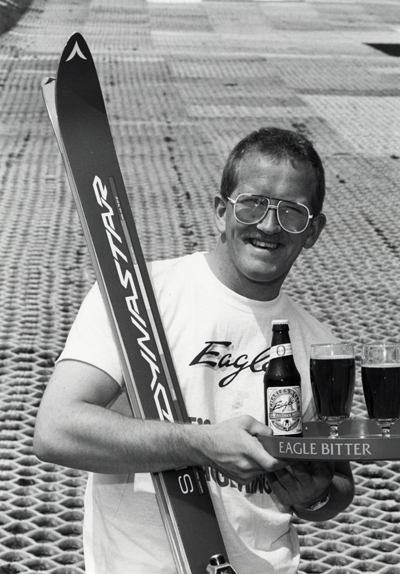
Possibly there is too much emphasis today on sporting excellence, and not enough on just having fun. Step forward Michael Edwards better known as Eddie 'The Eagle' Edwards, who was born in Cheltenham, but lived in Bedfordshire at the height of his fame. A good downhill skier, he narrowly missed out on the GB team for that event at the 1984 Games. He then switched to ski-jumping where his lack of success at the 1988 Olympics at Calgary endeared him to all, but in 1990 the International Olympic Committee (IOC) changed the rules on qualification for the Games, effectively banning him.

Some may argue that exercise is not always good for you, and early manorial court rolls show that they are right! The Millbrook rolls [ref.L26/48] show that 10 local men were fined 20d each for playing bowls and tenecias (tennis) in 1502. The playing of these sports, along with football and ninepins, was outlawed on Sundays because it interfered with archery practice and church attendance.
Bedfordshire has produced several prominent cyclists, possibly thanks to its fairly flat terrain and long main roads such as the A1 and A5. Victoria Pendleton of Stotfold, who won gold in the cycling sprint at the 2008 Olympics, as well as many other awards, is one of a long line of successful Bedfordshire cyclists. In the 1880s the invention of the safety bicycle - with pneumatic tyres, rear chain drive and equal-sized wheels – helped to change cycling from a pastime into a sport. Early pioneers include Dan Albone of Biggleswade (1860-1906), Frederick Bidlake of Girtford (1867-1933), Arthur Gell of Bedford (1874-1955) and Charlie Cole of Dunstable (1900-c1985). All these men devoted their lives to cycling, and most of them ran cycling and/or motor businesses.
Cycling was included in the first modern Olympics in 1896 and has been a premier event ever since, but it is much more than simply a sport. The development of a range of cycling clothing for women in the 1890s meant that both sexes could enjoy the sport. Cycling trips were very popular a century ago; there was little road traffic then and men and women could exercise in fresh air with the prospect of a picnic as well.
At about the same time technological change was having such an effect on the popularity of cycling, similar influences were at work in the field of racquet sports. The development of a leisured middle class and the invention of the bouncing rubber ball and efficient lawnmowers in the nineteenth century were all key factors.
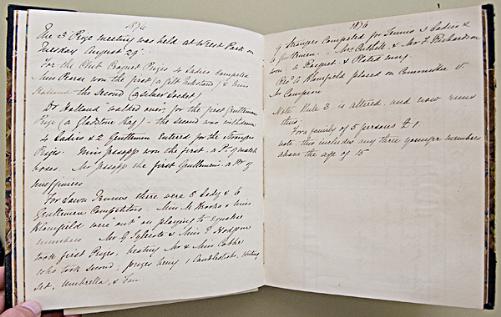
The minute book of the South Beds Croquet Club here (ref: LL 17/323) describes the earliest known tennis tournament in the County, at Wrest Park on 29 August 1876. The prizes in the small mixed-doubles tournament included a candlestick, writing set, umbrella and a fan. This was a year before the Wimbledon Lawn Tennis Championships was founded (1877).
Bedfordshire has produced some notable tennis players – the most famous being Valerie Scott of Bedford who reached the last 16 at Wimbledon in 1939 – but it is in badminton that we have really excelled. Daphne Young, later Warrington, of Bedford (1915-1993) won the All England badminton singles championship in 1938, as well as national singles titles in France, Scotland and Ireland in 1937-38. Daphne could not compete at the Olympic Games as badminton was not included until 1992. By contrast, Gail Emms, MBE, of Bedford, took silver at the 2004 Olympics in the mixed doubles with Nathan Robertson, and gold at the 2006 World Championships.
The River Great Ouse at Bedford has helped to shape the town's trading, leisure and sporting heritage, as well as providing a training ground for the town's Olympic rowers. Water sports such as swimming, rowing and sailing have featured from the very first modern Olympics in 1896. Jack Beresford, CBE, (1899-1977), attended Bedford School and won five medals (3 gold and two silver) at successive Olympic Games between 1920 and 1936. More recently, Tim Foster, a former pupil of Bedford Modern School, specialised in the coxless fours. He won gold in the world championships in 1997 and 1998, and then followed that with gold at the 2000 Sydney Olympics as part of the famous crew which included Sir Steve Redgrave, Sir Matthew Pinsent and James Cracknell. He retired in 2001.
Arguably, the achievements of Beresford and Foster were influenced by the development of Bedford as a centre for rowing. The first official Bedford Regatta took place on 25 August 1853 and its success encouraged the development of the river for sport and leisure. The Embankment area as we know it today was laid out in the 1870s and 1880s, while Bedford Rowing Club was formed in 1886.
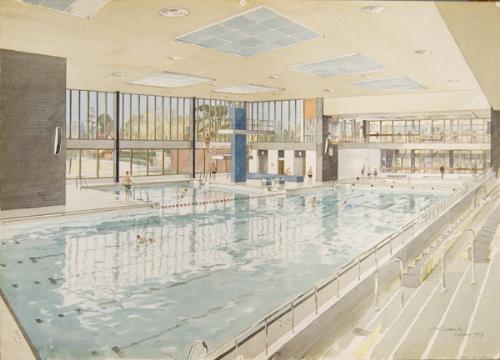
In October 1969 Bedford's first public indoor swimming pool opened, the Robinson Pool, and soon acquired its most famous coach in Brian Brinkley. Brinkley's career blossomed when he joined the Modernians Club at Bedford in the late 1960s. He won a gold medal in the 200m butterfly at the 1974 Commonwealth Games, and represented Britain at the Olympic Games in 1972 and again in 1976 when he won bronze in the 4x200m freestyle relay, retiring shortly afterwards.
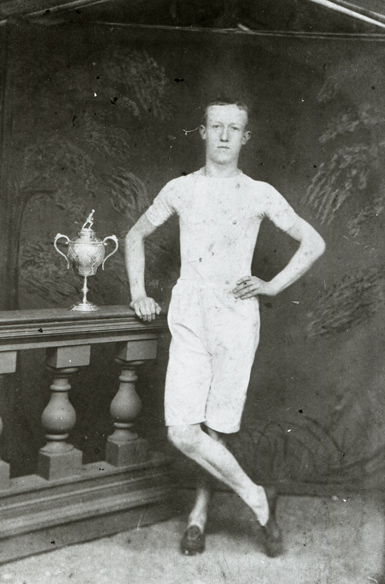
Track and field events have come a long way since Charles Dale, one of the first Bedfordshire policemen recruited in April 1840, was reprimanded for neglect of duty and running a foot race, (ref: QES 8). Robert Holden Crawley (above) (1864-1922), son of a Bedford ironmonger, was a champion local athlete in the 1880s, but we know little about his athletic career. By contrast, Harold Abrahams of Bedford (1899 - 1977), is one of our most famous Olympians. He won the 100 metres gold medal at Paris in 1924, and his feat was further immortalised by the 1981 film Chariots of Fire.
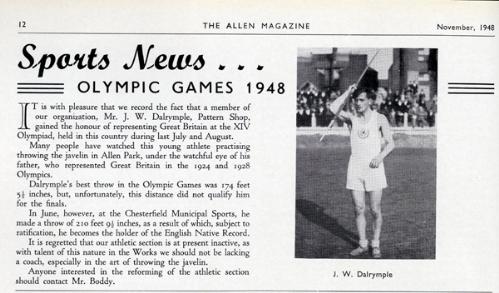
Javelin thrower Malcolm Dalrymple of Bedford (1922-2008) worked for the local engineering firm W. H. Allen, Sons & Co. Ltd. and competed at the 1948 London Olympics. His father James (1892-1960) also competed in the javelin, overcoming war wounds which had left him severely disabled. He practised in the Midland Railway yards where he worked as a carriage cleaner.
Paula Radcliffe MBE of Oakley, Beds. and Leicester is the current women's world record holder in the marathon with a time of 2:15:25. She has also won several Marathon events: London (3 times), New York (twice) and Chicago (once). She has represented Britain at four Olympics (1996-2008).
The careers of the Bedfordshire sporting heroes we have summarised here show how strongly the factors of time and chance come into play in their individual histories. Many lived well before the modern Olympics were established (1896) and at a time when travel was slow and difficult. They also needed to combine sporting prowess with earning a living. They also enjoyed comparative anonymity, whereas today’s modern stars have to cope with the double-edged sword of relentless media scrutiny. Nigel Lutt